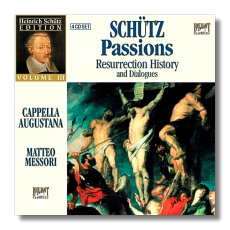
The Internet's Premier Classical Music Source
Related Links
- Schütz Reviews
- Latest Reviews
- More Reviews
-
By Composer
-
Collections
DVD & Blu-ray
Books
Concert Reviews
Articles/Interviews
Software
Audio
Search Amazon
Recommended Links
Site News
 CD Review
CD Review
Heinrich Schütz

Schütz Edition Volume III
Passions, Resurrection History, and Dialogues
- Historia der Auferstehung Christi, SWV 50
- Matthäuspassion, SWV 479
- Lukaspassion, SWV 480
- Johannespassion, SWV 481
- Die Sieben Worte Jesu Christi am Kreuz, SWV 478
- Weib, was weinest du?, SWV 443
- Es gingen zeene Menschen hinauf, SWV 444
Gerd Türk, Evangelist and Jesus (Sieben Worte)
Bas Ramselaar, Jesus (Passions)
Matteo Messori, organ
Cappella Augustana
Il Sonar Parlante/Matteo Messori
Brilliant Classics 92795 DDD 4CDs: 48:09, 60:51, 53:54, 55:35
Heinrich Schütz commonly is regarded as the most important composer to live in Germany before Johann Sebastian Bach. He studied with Giovanni Gabrieli and is thought also to have studied with Monteverdi. His three Passions probably were composed in the 1660s while he was serving as Kapellmeister for the Prince-Elector of Saxony in Dresden – a post he held for most of his life, although he spent some time in Venice, Copenhagen, and elsewhere. Hearing his Passions, which are among the most unadorned narrations of Christ's judgment and crucifixion, one can hardly believe that Schütz was influenced by the aforementioned Italian masters. However, at the time that Schütz composed them, he was in his seventies and eighties, and had dramatically pared down his style from the first book of the Symphoniæ Sacræ, for example. The Historia der Auferstehung Christi is a much earlier work (circa 1623) ; Die Sieben Worte dates from around the time of the Passions.
The Passions are essentially long and unaccompanied narrations for the Evangelist (here eloquently sung by tenor Gerd Türk), with contributions from Jesus (bass Bas Ramselaar, who sings with nobility and gentleness). The smaller roles are taken by the members of the choir. On this recording, the choir in the Passions and the Historia is very small -eight or nine members total – and this is in contrast to older recordings, in which much larger choral groups were used. A good choice has been made here, because it makes the music cleaner and more intimate. This is not music one casually turns on while making the beds or peeling the potatoes. Concentration is needed to hear and to absorb the story being told, and to appreciate the sober beauty of Schütz's settings. Concentration is optimized by such concentrated performances.
Brilliant Classics is releasing a multi-volume "HeinrichSchütz Edition," of which this is the third volume. The Bologna-born Messoria dds a little Italian warmth and color to these austere works to good effect. In the surprisingly thick booklet included with this set – it also includes texts and translations – Messori explains the history of these works, places them in context, and discusses his rationale for presenting this music in such an intimate manner. The members of the Capella Augustana bring a quiet intensity to everything here, never losing focus even in the longer Passions. My favorite work and performance in this set, however, was the short Easter dialogue Weib, was weinest du?, performed here by two sopranos and two (male) altos, and accompanied by Messori on an organ. As told in John 20, after Christ's resurrection but before his ascension, Christ appeared to Mary Magdalene, who was weeping because Christ was not in the tomb. She reaches outto Him, but He tells her not to touch Him, presumably because He no longerwishes to be associated with flesh and the Earth. Schütz's setting of this episode is simple and heartrending, particularly in the alternating cries of "Maria!" and "Rabbuni!," (an affectionate form of "Master!"), and Messori, with singers Marzena Lubaszka, Elzbieta Adamczyk, David Munderloh, and Vincent Liè vre-Picard, perform it penetratingly.
These recordings, made in Parma, date from 2005, and are enhanced by wonderfully warm and detailed sonics. This is an excellent way to acquire all three Schütz Passions at the same time, plus other excellent works, both long and short, by this still too little known German master.
Copyright © 2006, Raymond Tuttle




















